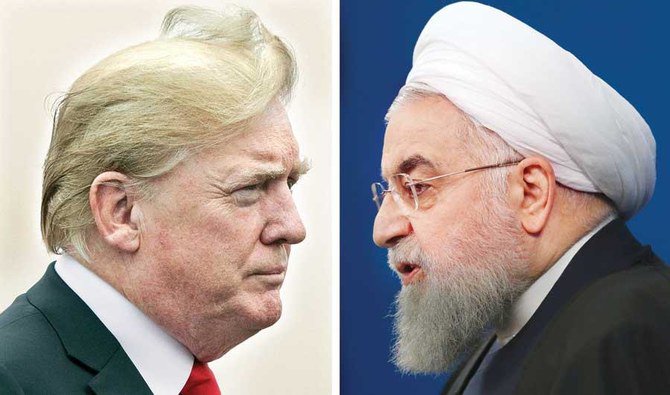Iraqi premier’s US-Iran mediation credited for averting ‘hell’ of war

Iraqi Prime Minister Adel Abdul-Mahdi’s mediation between the US and Iran amid current military tensions was on Friday credited for averting the “hell” of war.
During the past few weeks the premier has been acting as a “postman” for Washington and Tehran, two of Abdul-Mahdi’s advisers told Arab News.
However, Shiite leaders and the commanders of two armed factions linked to Iran have told Arab News that short-range rockets have been handed to two Iraqi groups over the past fortnight “to be ready to strike US targets inside Iraq if the United States were to strike Iran.”
Tensions between the Americans and Iranians have been rising since the US withdrew from a nuclear agreement and imposed tough economic sanctions on Iran, moves which prompted veiled Iranian threats to chokepoint shipping lanes in the region.
The dispute reached a peak over recent days following attacks on four tanker ships and two Saudi oil installations, all blamed on Iranian-backed militia groups.
Iraq has been a major US-Iran battleground since 2003. Iran has significant influence in Iraq and controls dozens of Shiite, Sunni, Christian and Kurdish armed factions it has helped form, fund, train and equip. These fighting forces have been operating as Iran’s proxies in Iraq and Syria, and most of the US’s interests in both countries are located within the range of their rockets.
Mediation role
“(US Secretary of State Mike) Pompeo asked Adel Abdul-Mahdi to be a back channel of communication between them (the US) and the Iranians to convey some messages, and the Iranians agreed to that,” one of the Iraqi premier’s advisers said.
“We will not wait until the gates of Hell open. Transferring messages between the two parties and playing the role of mediation, is a decision taken by the Iraqi leadership to avoid the outbreak of war between the two sides. Iran has agreed also to allow Iraqis to intermediate between the two sides,” the adviser added.
Pompeo made a brief visit to Baghdad two weeks ago, during which he passed on the first US message to the Iranians.
The second of Abdul-Mahdi’s advisers said: “Pompeo asked Abdul-Mahdi to take back the rockets of the armed factions and to tell the Iranians to leave US bases and camps in Iraq out of their calculations and to distance them from what is happening in the Gulf. Pompeo said that targeting any of the American interests inside Iraq would be answered (by hitting targets) deep inside Iran.”
Iran relies mainly on its proxies in Iraq, Syria, Lebanon and Yemen to hit the interests of its rivals in the region. Intelligence reports have proved that the targeting of four ships in the port of Fujairah early this week by drones, were carried out by Yemeni militias with Iranian encouragement.
Point of confrontation
Iraqi leaders fear that if war broke out, Iraq would be “the first point of confrontation” between the US and Iran. More than 5,000 US troops are deployed in joint camps and military bases with Iraqi forces across the country, which has the largest US Embassy in the world, two consulates in Irbil and Basra, as well as dozens of US oil companies and hundreds of workers in various sectors.
At least three prominent Shiite leaders and the commanders of two armed factions linked to Iran told Arab News that short-range rockets had been handed over to two Iraqi groups over the past two weeks “to be ready to strike US targets inside Iraq if the United States were to strike Iran.”
They added that “a list of US strategic targets in Iraq and the region has been prepared to be within the range of rockets of these factions when needed.”
A commander of an armed faction linked to Iran, told Arab News: “The message carried by Abdul-Mahdi to the Iranian side has temporarily changed the direction of the battle.” He said fighters had been ordered to remain calm, show restraint, and not to hit any foreign targets inside Iraq “until further notice.”
The commanders revealed that Gen. Qassem Soleimani, commander of the Iranian Revolutionary Guard Corps, met with a number of leaders of the Shiite factions in Baghdad two days before the start of the month of Ramadan, and discussions focused on the latest developments in the region and the available options for dealing with US pressure on Iran.
“We will rely on short-range missiles to strike US interests in Iraq if the United States began the war, these are the directives,” another commander said. “The factions have not received any long-range missiles from Iran.”
Kata’ib Hezbollah-Iraq, one of the most anti-US Shiite armed groups, which carried out deadly attacks on American troops in Iraq in 2007-2011, and Harakat Hezbollah Al-Nujaba (HHN), an offshoot of Asa’ib Ahl Al-Haq (AAH), would “spearhead” any attacks launched by Iran on US interests in Iraq and Syria in the event of war, commanders said.
Rockets were handed to both groups, but AAH and other paramilitaries linked to Iran would only be used as backup during any confrontation, the commanders added.
